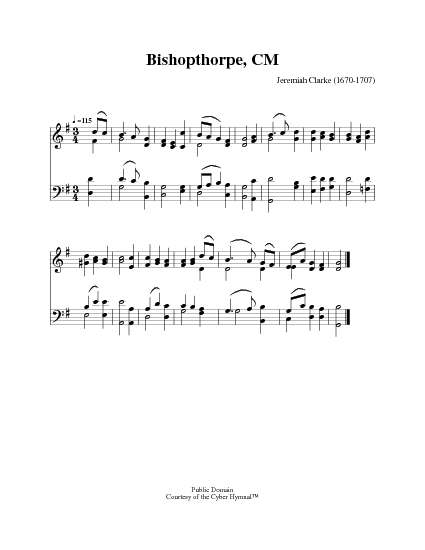- |
User Links
Soon as I heard my Father say

Soon as I heard my Father say
Author: Isaac WattsPublished in 162 hymnals
Printable scores: PDF, MusicXMLAudio files: MIDI
Representative Text
6 Soon as I heard my father say,
"Ye children, seek my grace,"
My heart reply'd without delay,
"I’ll seek my Father’s face."
7 Let not thy face be hid from me,
Nor frown my soul away;
God of my life, I fly to thee
In a distressing day.
8 Should friends and kindred near and dear
Leave me to want or die,
My God would make my life his care,
And all my need supply.
9 My fainting flesh had dy'd with grief,
Had not my soul believ'd,
To see thy grace provide relief;
Nor was my hope deceiv'd.
10 Wait on the Lord, ye trembling saints,
And keep your courage up;
He’ll raise your spirit when it faints,
And far exceed your hope.
Source: Church Hymn Book: consisting of newly composed hymns with the addition of hymns and psalms, from other authors, carefully adapted for the use of public worship, and many other occasions (1st ed.) #P.XXVII.II
Author: Isaac Watts
 Isaac Watts was the son of a schoolmaster, and was born in Southampton, July 17, 1674. He is said to have shown remarkable precocity in childhood, beginning the study of Latin, in his fourth year, and writing respectable verses at the age of seven. At the age of sixteen, he went to London to study in the Academy of the Rev. Thomas Rowe, an Independent minister. In 1698, he became assistant minister of the Independent Church, Berry St., London. In 1702, he became pastor. In 1712, he accepted an invitation to visit Sir Thomas Abney, at his residence of Abney Park, and at Sir Thomas' pressing request, made it his home for the remainder of his life. It was a residence most favourable for his health, and for the prosecution of his literary… Go to person page >
Isaac Watts was the son of a schoolmaster, and was born in Southampton, July 17, 1674. He is said to have shown remarkable precocity in childhood, beginning the study of Latin, in his fourth year, and writing respectable verses at the age of seven. At the age of sixteen, he went to London to study in the Academy of the Rev. Thomas Rowe, an Independent minister. In 1698, he became assistant minister of the Independent Church, Berry St., London. In 1702, he became pastor. In 1712, he accepted an invitation to visit Sir Thomas Abney, at his residence of Abney Park, and at Sir Thomas' pressing request, made it his home for the remainder of his life. It was a residence most favourable for his health, and for the prosecution of his literary… Go to person page >Text Information
| First Line: | Soon as I heard my Father say |
| Author: | Isaac Watts |
| Meter: | 8.6.8.6 |
| Language: | English |
| Copyright: | Public Domain |
Tune
LAMBETH (Schulthes)Credited to Wilhelm Schulthes, 1871, in The Hymnal (1916). Reviews of his works in The Musical Times in 1871 include an "Ave Maria" for organ/piano and "O Salutaris" for soprano and choir. These pieces appear to be exceptionally rare and are not readily available for study. —Chris Fenner
ST. AGNES (Dykes)
John B. Dykes (PHH 147) composed ST. AGNES for [Jesus the Very Thought of Thee]. Dykes named the tune after a young Roman Christian woman who was martyred in A.D. 304 during the reign of Diocletian. St. Agnes was sentenced to death for refusing to marry a nobleman to whom she said, "I am already eng…
BISHOPTHORPE (Clarke)


 My Starred Hymns
My Starred Hymns


